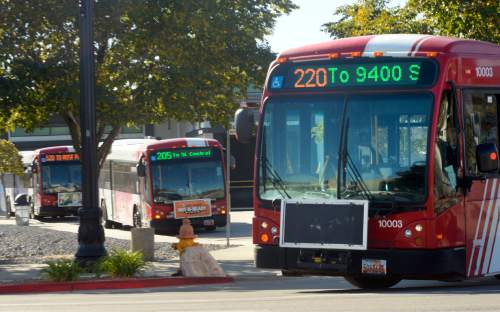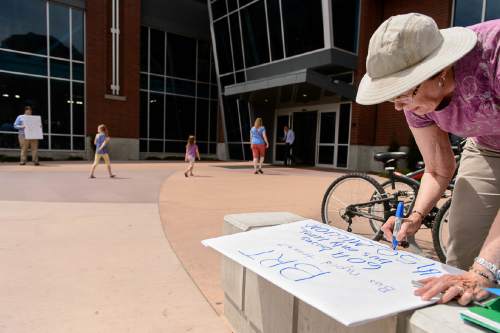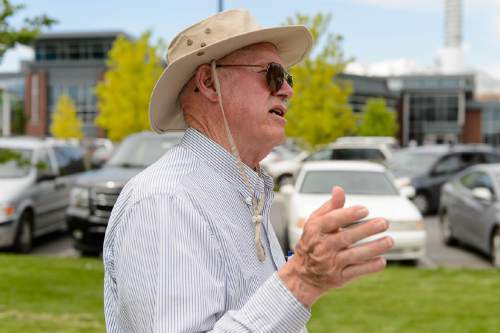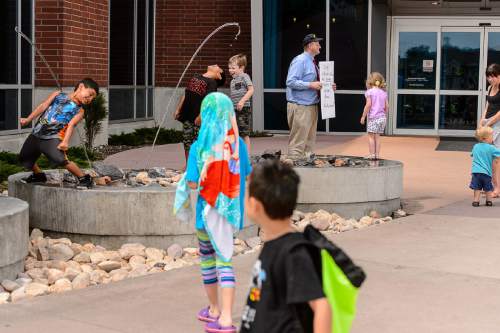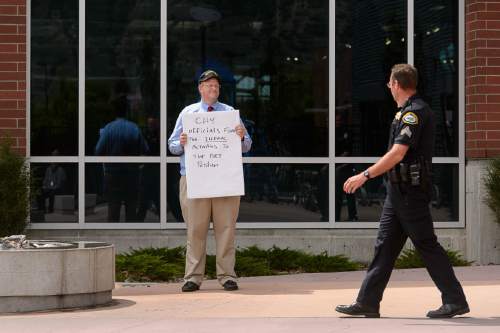This is an archived article that was published on sltrib.com in 2016, and information in the article may be outdated. It is provided only for personal research purposes and may not be reprinted.
Provo • Two city officials in Provo and Orem have been fined for illegally using their city email accounts to fight a grass-roots referendum against a controversial transit project.
Provo Deputy Mayor Corey Norman and Steven Downs, assistant to the Orem city manager, were fined Wednesday by Utah County Clerk-Auditor Bryan Thompson.
A letter to each said that state law "prohibits a person from sending an email using the email of a public entity to advocate for or against a ballot proposition."
Thompson said he found that each had done exactly that to attack a petition drive seeking to overturn the cities' recent approval of leases to the Utah Transit Authority to help a $190 million "bus rapid transit" (BRT) and road-improvement project between Provo and Orem.
He fined each $250 "for a first infraction" and warned that "a subsequent infraction carries a substantially increased fine."
Emails from both had spread word about meetings by the cities to discuss the petition drives and asserted they were falsely claiming they could stop the BRT project. Cities say the referendum would not stop the project, but would prevent enhancements they had negotiated with UTA.
Groups pushing referendums in both cities filed complaints last month with Lt. Gov. Spencer Cox, alleging that Provo and Orem were using taxpayer money to send emails, hold meetings and make videos to fight them, even though they said state law bans that.
Cox's office referred the matter to Thompson to investigate locally.
"Both city administrations have tried to do an end run around the law by saying they are 'educating' the public, but it has gone far beyond that," said Frank Anderson, a leader of the petition-gathering group in Provo.
"They crossed a line long ago, and it started when they accused the referendum group of spreading misinformation, and characterized themselves and UTA as the only sources of truth and accuracy. Their campaign has been damaging."
Downs said Thursday that he plans to contest his fine and is working with the Orem City attorney's office on that. "We will have further comment at a later time," he said.
Similarly, Norman said in an email that he also plans to challenge the fine.
"It's important for me to stay within the scope of the law," he said. "Mr Thompson's opinion differs from that of our city's legal team. We plan to appeal his decision and are confident we can show a mistake has been made."
Norman earlier said the city was trying to educate residents about the effects of the referendum.
He adds that state law appears to be silent about where an appeal may be filed. "We are researching that process as we look at the issue."
State law allows residents to overturn new laws passed by city councils if they obtain enough signatures within 45 days of passage to put it on a ballot. Petitioners now seek to reverse the April 26 approval by Provo and Orem city councils of leases to allow UTA to use city streets for BRT, including for stations and bus-only lanes.
Norman earlier said UTA "can already operate on city streets," so any vote would not stop the BRT project. But "the lease provides the opportunity to do the enhancements that we have been negotiating for the last seven or eight months" to mitigate neighborhood impacts.
The lion's share of the project also would operate on state highways — such as University Boulevard and University Parkway — which are not affected by the city leases.
The petition-gathering groups say the BRT project is too expensive, would have low ridership and may worsen congestion for other vehicles on the road.
Provo and Orem have said they believe the referendums are illegal because the leases they seek to overturn are administrative actions and not the type of new ordinances that state law allows to be reversed by referendum.
However, the cities said Utah Supreme Court decisions make them wait until after signatures are presented to reject them formally.
Anderson said petition gatherers find it "a daunting thing to have to go up against the money, resources, influence and power of city hall — and to have our own taxpayer dollars used against us is just wrong."
He also said that Provo officials have removed petition seekers, he believes illegally, from public property.
Phillip Hinckley, a signature gatherer, said police removed him from in front of the Provo Recreation Center on Saturday.
He protested that it was public property, but was given a legal analysis from the city, saying it had declared the faraway sidewalks there as the center's "free-speech zone" — so he could gather signatures there only. He was given the option of renting a room at the center to gather signatures.
Hinckley returned Thursday morning and again attempted to gather signatures in front of the building. He said center officials called police and that he left as police approached, but they caught up with him and told him he was trespassing. He also was told he is not allowed to be in front of the building for 30 days.
Hinckley called The Salt Lake Tribune and said others would attempt to gather signatures there again in the afternoon.
Police returned in the afternoon and asked for Hinckley amid others planning to protest, where a Tribune photographer and reporter identified themselves. Officers then went inside the center to talk to city officials.
When police emerged, they greeted protesters holding signs and shouting to passers-by, urging them to sign petitions. Police then left. Center officials later took pictures of the protesters, but they did not seek to stop their activities.
"They didn't want any more trouble" with the news media watching, Hinckley said, as he remained in the faraway "free-speech zone" on the sidewalk. "Last week, the mayor had a public meeting here to tell people how great BRT is, but they won't let me collect signatures. It isn't right."
Construction on the new BRT is scheduled to start this summer and is expected to begin operation in spring 2018. It will connect FrontRunner stations in Provo and Orem via Utah Valley University, University Mall, Brigham Young University, downtown Provo and the Provo Towne Centre mall.
BRT would have extra-long buses travel along bus-only lanes for about half their 10.5-mile Provo-Orem route. Passengers would buy tickets from machines before boarding, and buses would have extra doors to speed entry. Buses may receive priority at traffic signals, and they would arrive about every six minutes at peak times.


